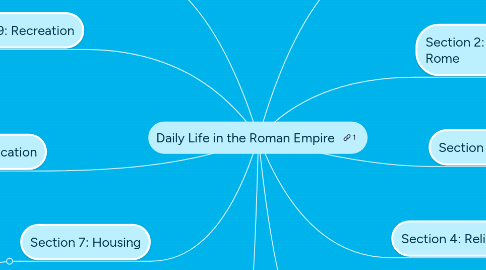
1. Section 6: Food and Drink
1.1. Main Idea: What the Romans ate depended on whether they were rich or poor.
1.1.1. The poor cooked on small grills and depended on "fast - foods" called thermopolia. Only the rich had kitchens in their home. Common foods in Rome were bread, beans, spices, vegetables, cheese, and meat. They usually drank plain water with herbs or honey.
2. Section 7: Housing
2.1. Main Idea: There was a major contrast between the rich and poor houses in Rome.
2.1.1. The poor had small, dark houses while the rich owned spacious and airy homes. The wealthy Romans had houses made of stone or marble, while the poor had wooden houses. In poor houses, disease and sickness spread quickly. The wealthy had beautiful mosaics and statues in their homes.
3. Section 8: Education
3.1. Main Idea: Wealthy Romans went to school, but the poor didn't.
3.1.1. Most of the poor were sent to work instead of school. The work they did was leather working and metalworking, to help earn money for their family. The wealthy children were often tutored by their father or by slaves. Their classes took place in their homes or in public buildings. The boys learned Latin, Greek, math, science, literature, music, and public speaking. The girls often became dentists, real estate agents, or tutors.
4. Section 9: Recreation
4.1. Main Idea: Rome had many forms of recreation that were used every day.
4.1.1. Rome had public baths that were used by the rich and the poor. The wealthy could enjoy plays in theaters or in another's home. The Colosseum was a place where the Romans watched gladiators fight in an arena. One of the Romans favorite gathering places was at the Circus Maximus, a huge racetrack with enough viewing space for 200,000 people.
5. Section 10: Country Life
5.1. Main Idea: About 90% of Rome's population lived in the country, but even here there were rich people and poor people.
5.1.1. Wealthy, country living, Romans owned estates with large homes called villas. The Romans invested money in their villas to provide crops and livestock. These farms and estates provided most of the food for many of the Roman cities. There weren't many slaves in the country but those who were lived very hard lives. They owned their own small farms and tried to make enough money to survive. Sometimes, they would work at the larger estates and do the farming work.
6. Section 1: Introduction
6.1. Main Idea: The Forum was the center of Rome
6.1.1. The word forum means gathering place. The forum was an open area used for merchant stalls, races, games, and plays. This section mostly gives information on the forum and what it was used for. The forum was the heart of life in Rome.
7. Section 2: Daily life in Ancient Rome
7.1. Main Idea: Most of Rome's population were poor.
7.1.1. Rome was full of beautiful temples and buildings, but many people in Rome lived in tiny apartments. Most of the city's population lived in neighborhoods full of crime and disease. Most children were lucky if they lived over the age of 10. To keep the poor happy, Roman Emperors provided them with food and gladiator fights.
8. Section 3: Law and Order
8.1. Main Idea: The Roman Empire laws and order are different from the previous Rome
8.1.1. Instead of the Roman Senate controlling laws, the Roman Emperors did this. Although the Roman laws were very strict, crime was still frequent. Crimes like stealing, assault, and murder. In Rome, a jury of citizens would decide a case.
9. Section 4: Religion
9.1. Main Idea: Religion was very important to Romans and they adopted many Greek gods but changed their names.
9.1.1. Religion was a daily part of the Romans life. Each house had an alter where the family worshiped household gods and spirits. In time, the Romans began to worship their emperors as gods.
10. Section 5: Family Life
10.1. Main Idea: In a household or family, the father was in charge of the others.
10.1.1. A Roman father's words, were laws in a household. A father was expected to provide food and other necessities for the family by working, or by paying poor families to do the work for them. At ages 14 - 18, a Roman would celebrate becoming a man. Men were usually married between the ages of 12 - 18.
